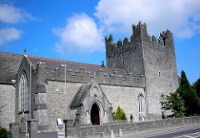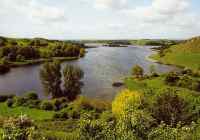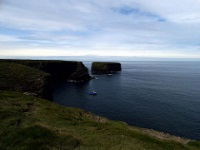Limerick Travel Guide
Limerick has a picturesque location on the River Shannon, roughly halfway between Cork and Galway. It is still an underrated travel destination, often overlooked by the millions of tourists who spend their Ireland holidays in well-known spots such as Dublin and Killarney.
Limerick was originally conquered by the Vikings in the 10th century, and was established as an early base for the Christian church. Several structures, including St Mary's Cathedral and the Trinitarian Abbey in the Medieval Heritage Precinct, date back as far as the 12th century. King John's Castle and Cathedral are also popular sights, as is the Treaty Stone on Thomond Bridge, commemorating a peace agreement between William of Orange and the Jacobites in 1691.
Limerick endured much economic hardship in the 20th century and, though gleaming buildings are added to the skyline every few years, the city has difficulty removing itself from the images of crime and poverty associated with Frank McCourt's best-selling novel . Even today, the crime rate in Limerick is higher than most other Irish cities.
Even through these hardships, Limerick is a lively city with a serious love of both sport and the arts. Visitors can catch a Munster Rugby match at Thomond Park, then eat and drink at any of the city's dozens of restaurants, bars and pubs. On weekends, the Milk Market and Potato Market offer the chance to buy just about anything from books and antiques, to local arts, crafts and fresh food.
In contrast with the city, the surrounding Limerick County is a rolling landscape of pretty farmland, with the winding River Shannon curling around picture-perfect villages such as Adare and the seaside resort of Kilkee.
Things to do in Limerick

Adare
Nestled in a wooded landscape among the picturesque farmlands of the Golden Vale, Adare is known as one of the prettiest villages in Ireland. It is conveniently located just ten miles (16km) from Limerick City, and connected to many other Irish towns by bus. The small village is centred on a street of thatched Tudor-style cottages and hedges, surrounded by intriguing medieval churches and castle ruins.
Attractions include Desmond Castle, the Trinitarian Abbey, the Augustinian Priory, and the Franciscan Friary. A visit to the Adare Heritage Centre is a must for anyone interested in the rich history of this town, which dates back to the Norman conquest of Ireland. The exhibitions offer some good contextual information on the churches and abbeys to be visited in the area, and the information is available in five different languages. Adare is within easy distance of three golf courses, and the town has a good selection of restaurants, pubs and craft shops. Adare's Old Creamery is a hit with visitors searching out quality tea and treats, and the shop's Christmas and Halloween-themed merchandise is pretty entertaining. For a bit of fresh air and some insight into Celtic worship, visitors can stroll around the lovely Celtic Park gardens.

Lough Gur
Lough Gur is a lake situated less than 14 miles (23km) south east of Limerick. Although the area's lovely scenery provides enough reason to visit, its remarkable archaeological remains are the main attraction.
Lough Gur has been inhabited by humans since about 3000 BC, and the extensive remains make it one of Ireland's most important archaeological sites. There are relics from the Stone Age, Bronze Age, Iron Age and Early Christian civilisations, as well as Medieval ruins all in one area. These show that Lough Gur has been continuously inhabited for at least 5,500 years. The Grange stone circle near the lake is the largest in Ireland and is seen by locals as a place of mystic power, similar to Stone Henge. There are also grave sites, a dolmen (rock monument), crannogs (artificial islands) and some ring forts.
The site contains a Heritage Centre with exhibitions on Lough Gur's history. They detail the significance of the archaeological remains, and bring the place to life in the imagination. However, the best way to explore the area is on a walking tour with one of the very well-informed guides. Visitors can also take self-guided audio tours. There are lovely picnic areas and walking trails to enjoy, and a small shop that sells snacks and refreshments.

Kilkee
Kilkee has its roots as an exclusive Victorian seaside resort for wealthy merchant families. It's known for the beautiful sandy beach that now draws families from all over the UK. In its heyday, Kilkee attracted some famous people. Charlotte Bronte spent her honeymoon in the little village, and Lord Tennyson also came holidaying.
The beach is great for swimming and is protected by a reef, which tends to ensure calm waters in the bay. In fact, it is said to be one of the safest beaches in Ireland. It's a popular diving spot, and offers several picturesque swimming areas, including a formation of natural rock pools called the Pollock Holes. It's also a well-loved sailing and boating destination. If the weather isn't kind, visitors can still have some fun at Kilkee Waterworld.
Kilkee has land-based attractions and activities as well, including a golf course and a number of restaurants and bars in town. Kilkee gets busy in late June each year, when it hosts the Hell of the West Triathlon. In fact, the seaside village is busy for most of the summer season.
Ireland travel info
Electricity
Electrical current is 230 volts, 50Hz. UK-style three-pin and round three-pin plugs are in use.
Language
English is the principal language, although a minority of people speak Irish (Gaelic).
Money
The unit of currency is the Euro (EUR). Currency can be exchanged at banks and bureaux de change, and ATMs are widely available. Credit and debit cards are widely accepted.
Tipping
A 10 percent tip will be welcomed in restaurants and cafes, and occasionally a service charge will be added to the bill. Tipping is not usual in bars and pubs, or for other services.
Health
There are no special health requirements for visitors, though all eligible travellers should be up to date with their COVID-19 vaccines. A European Health Insurance Card (EHIC) should be obtained before departing for Ireland. After Brexit, the Global Health Insurance Card (GHIC) replaced the European Health Insurance Card (EHIC) for UK citizens. The GHIC allows UK citizens access to state healthcare during visits to the EU. The GHIC is not valid in Norway, Iceland, Liechtenstein or Switzerland, nor is it an alternative to travel insurance. Medical facilities are good and medicines are widely available; if travellers require specific medication, it is always advised that they bring it with them. Travellers should make sure to carry all medications in their original containers, clearly labeled. They should also have a signed, dated letter from their doctor describing all medical conditions and listing all prescribed medications, including generic names.
Safety
Most visitors to Ireland enjoy a fairly high level of personal safety. Ireland has a very low level of violent crime, but there is a high incidence of petty theft in tourist areas and foreigners are targeted by pick-pockets. Travellers should take sensible precautions against petty theft, including duplicating important documents, carrying valuables in separate bags or pockets, and leaving valuables in hotel safes whenever possible. Terrorism is no more a threat in Ireland than in other Western countries and safety in the country has improved significantly with peace in Northern Ireland. Those travelling into Northern Ireland should note that the safety alerts for that country are completely seperate and can be found in the United Kingdom travel guide.
Local customs
The Irish are warm and welcoming and their conversation is often light hearted and dosed with humour, irreverence and self-depreciation. A handshake is the normal form of greeting, though close friends will hug or kiss each other on the cheek. The pub remains at the centre of many communities, and alcohol may be bought by anyone over 18 years old. Smoking is not allowed in public spaces, including in pubs and restaurants. Visitors should refrain from forcing discussions of political and religious differences and show respect if the topics are brought up. Attitudes towards LGBT people are liberal and same-sex marriage is legal.
Doing business
The Irish are very sociable and, although the usual elements of business etiquette apply (punctuality, formal wear, a courteous manner), foreigners can expect good conversation and a rather relaxed air. Handshakes are customary on introduction, and foreigners should take the lead from the host with regards to using first names or surnames. Business hours are usually from 9am to 5.30pm Monday to Friday, with a lunch break from 1pm to 2pm.
Duty free
Travellers over 17 years old arriving from non-EU countries do not have to pay duty on most products. Regulations allow 200 cigarettes, 100 cigarillos, 50 cigars, 250g tobacco; one litre of spirits with more than 22 percent alcohol volume, two litres of dessert wine, port of sherry with a maximum 22 percent alcohol content; and four litres of wine or 16 litres of beer. Other duty free products include perfume up to 50g or 250ml eau de toilette; and other goods for personal consumption to the value of €430 per adult or €215 for children under 15 years.
Communications
The international access code for Ireland is +353. Hotels, cafes and restaurants offering free WiFi are widely available; purchasing a local prepaid SIM card can be a cheaper option than accepting international roaming costs, which can be high.
Passport & Visa
All foreign passengers to Ireland must be able to show proof of sufficient funds to cover their stay in the country. Passengers should also hold return or onward tickets, and the necessary travel documentation for their next destination, as immigration officers might demand that they demonstrate proof of their intention to leave Ireland. If the traveller's passport bears a British inadmissable stamp, unless the immigration officer is convinced that they will not travel on to the United Kingdom, entry may be refused to Ireland. It is highly recommended that travellers' passport have at least six months' validity remaining after the intended date of departure from their travel destination. Immigration officials often apply different rules to those stated by travel agents and official sources.
Entry requirements
US citizens must have a passport that is valid for the period of intended stay in Ireland. No visa required for 90 days.
British citizens must have a passport that is valid upon their arrival in Ireland. Passport exemptions apply to holders of proof of nationality issued to nationals of Ireland and British subjects, for travel between Ireland and Great Britain and Northern Ireland only. No visa is required for holders of British passports endorsed British Citizen, British National (Overseas), or British Overseas Territories Citizen.
Canadian citizens must have a passport that is valid for the period of intended stay in Ireland. No visa is required for 90 days.
Australian citizens must have a passport that is valid for the period of intended stay in Ireland. No visa is required for 90 days.
South African citizens must have a passport that is valid for the period of intended stay in Ireland. No visa is required for 90 days.
New Zealand citizens must have a passport that is valid for the period of intended stay in Ireland. No visa is required 90 days.
Useful contacts
Irish Tourist Office, Dublin: www.ireland.com
112 (general emergencies)Embassies / consulates in other countries
Irish Embassy, Washington DC, United States: +1 202 462 3939.
Irish Embassy, London, United Kingdom: +44 (0)20 7235 2171.
Irish Embassy, Ottawa, Canada: +1 613 233 6281.
Irish Embassy, Canberra, Australia: +61 (0)2 6214 0000.
Irish Embassy, Pretoria, South Africa: +27 (0)12 452 1000.
Consulate-General of Ireland, Auckland, New Zealand: +64 (0)9 977 2252.
Embassies / consulates in Ireland
United States Embassy, Dublin: +353 (0)1 668 8777.
British Embassy, Dublin: +353 (0)1 205 3700.
Canadian Embassy, Dublin: +353 (0)1 234 4000.
Australian Embassy, Dublin: +353 (0)1 664 5300.
South African Embassy, Dublin: +353 (0)1 661 5553.
New Zealand High Commission, London, United Kingdom (also responsible for Ireland): +44 (0)20 7930 8422.



